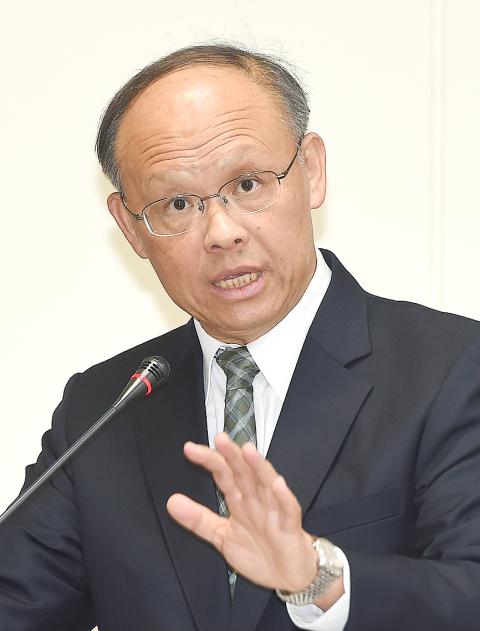Minister of Economic Affairs John Deng (鄧振中) yesterday said the ministry is drafting new regulations to allow Chinese investment in Taiwan’s IC design industry.
“I hope it would not take too long to ease the restrictions on Chinese investments ... but the ban will not be eased if a set of corresponding measures are not drafted completely,” Deng told reporters on the sidelines of a meeting of the legislature’s Economics Committee.
Asked if the planned easing would take effect before the Lunar New Year holiday next year, Deng said there is no time frame for the issue, but he hopes to lift the ban before his term ends in May.

Photo: Liao Chen-huei, Taipei Times
Deng said Taiwanese IC design companies must assure the government that they would not move their operations overseas after it allows Chinese investment.
The planned regulations are to include rules to prevent Taiwan’s core IC design technologies or IC designers from being “inappropriately” transferred to China.
The government would also review the possibility of trade secrets being leaked via investments from China, he said.
Current regulations allow Chinese companies to own minority shares in downstream semiconductor firms, such as foundry makers or package and testing companies. However, given the increasing global competition, the Ministry of Economic Affairs (MOEA) is under pressure to support Taiwanese IC designers by considering investments from Chinese firms.
“Local companies have been communicating with the ministry. We heard their requests. We understand that the restrictions need to be relaxed,” Deng said.
To allay potential concerns over the easing of restrictions, the ministry is to publicize the Industrial Development Bureau’s evaluation and measures once they are ready, he said.
The ministry would also hold public hearings for the planned regulations if required, he added.
Earlier this month, MediaTek Inc (聯發科), the nation’s largest chip designer, said it would adopt an “open attitude” toward cooperation with Chinese chipmakers to seek growth opportunities.
MediaTek’s remarks came after Tsinghua Unigroup (清華紫光) chairman Zhao Weiguo (趙偉國) said the Chinese firm was interested in acquiring shares in MediaTek if given the opportunity.
Separately, Deng said that Taiwan prioritizes a trade in goods agreement with China over the US-led Trans Pacific Partnership (TPP) for the moment, adding that he hopes talks on the trade pact with China would make a breakthrough by the end of this year.
As the TPP agreement awaits ratification from its 12 members, Taiwan would focus on speeding up the pace of negotiations with China, he said.
Earlier this week, Taiwan and China completed the 12th round of negotiations on the trade in goods agreement, but the talks stalled when Taipei turned down Beijing’s request to lift import bans on Chinese farm products.
Both sides are planning to hold a new round of talks next month, but Deng said it is hard to say when an agreement would be signed.
Additional reporting by CNA

In Italy’s storied gold-making hubs, jewelers are reworking their designs to trim gold content as they race to blunt the effect of record prices and appeal to shoppers watching their budgets. Gold prices hit a record high on Thursday, surging near US$5,600 an ounce, more than double a year ago as geopolitical concerns and jitters over trade pushed investors toward the safe-haven asset. The rally is putting undue pressure on small artisans as they face mounting demands from customers, including international brands, to produce cheaper items, from signature pieces to wedding rings, according to interviews with four independent jewelers in Italy’s main

Japanese Prime Minister Sanae Takaichi has talked up the benefits of a weaker yen in a campaign speech, adopting a tone at odds with her finance ministry, which has refused to rule out any options to counter excessive foreign exchange volatility. Takaichi later softened her stance, saying she did not have a preference for the yen’s direction. “People say the weak yen is bad right now, but for export industries, it’s a major opportunity,” Takaichi said on Saturday at a rally for Liberal Democratic Party candidate Daishiro Yamagiwa in Kanagawa Prefecture ahead of a snap election on Sunday. “Whether it’s selling food or

CONCERNS: Tech companies investing in AI businesses that purchase their products have raised questions among investors that they are artificially propping up demand Nvidia Corp chief executive officer Jensen Huang (黃仁勳) on Saturday said that the company would be participating in OpenAI’s latest funding round, describing it as potentially “the largest investment we’ve ever made.” “We will invest a great deal of money,” Huang told reporters while visiting Taipei. “I believe in OpenAI. The work that they do is incredible. They’re one of the most consequential companies of our time.” Huang did not say exactly how much Nvidia might contribute, but described the investment as “huge.” “Let Sam announce how much he’s going to raise — it’s for him to decide,” Huang said, referring to OpenAI

Nvidia Corp’s negotiations to invest as much as US$100 billion in OpenAI have broken down, the Wall Street Journal (WSJ) reported, exposing a potential rift between two of the most powerful companies in the artificial intelligence (AI) industry. The discussions stalled after some inside Nvidia expressed concerns about the transaction, the WSJ reported, citing unidentified people familiar with the deliberations. OpenAI makes the popular chatbot ChatGPT, while Nvidia dominates the market for AI processors that help develop such software. The companies announced the agreement in September last year, saying at the time that they had signed a letter of intent for a strategic